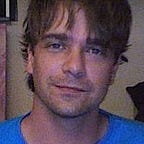How we leave this earth
Do you remember how you came here? A thought experiment for you:
Well, it’s in the middle of the night now and it’s raining outside. I look out the window at the raindrops and the branches of a willow tree waving in the wind, visible only via the moon. I think to myself: this is all so very beautiful. But I don’t get it! What the purpose? What is the plan?
I think about all the stories that I have been told and that I really should know who I am by now. I paused. A thought struck me: I am nothing.
So I asked myself: “How do we leave this earth?” A thought experiment for you:
When we are born, we really can’t do anything at all. We can’t even move our limbs in a coordinated fashion, let alone walk or talk. Naturally, at this stage, we aren’t anyone. We are a baby, a new human. We grow, we learn, we think, we play. We experience friends and society and culture. Some of us look further and experience the world and its various cultures. During all this, your “I am” is permanently formed. I read Bourdieu. He defined this as “habitus”. Habitus is not the result of free will or rigid structures, it evolves in a sort of interplay between them and over time. Habitus “is not fixed or permanent, and can be changed under unexpected situations or over a long historical period”(Navarro, Z. (2006) ‘In Search of Cultural Intepretation of Power’, IDS Bulletin 37(6): 11–22.)
Bourdieu also talks of “capital”. In his view, capital is not only a physical thing, it can be symbolic, cultural, or social. Everyone receives and continues to receive and creates a different set of “capitals” and this also is a dynamically changing thing over time. Depending on the development this “provides the means for a non-economic form of domination and hierarchy, as classes distinguish themselves through taste”. (Gaventa, J. (2003). Power after Lukes: a review of the literature, Brighton: Institute of Development Studies.)
So as we grow up, we become somebody. We have analyzed a lot of information and have experienced much more. We think we know what’s up. Sort of. We tell other people. We “are” somebody.
We create thoughts, memories, and things. Some great, some small. We give things to the community and we take things from the community.
Then, we die. The brain stops sending signals. As we came here, we leave again. All thoughts, memories, everything that defines the “I am” cease to exist. It simply dies in the brain and is forever lost. What remains is the communicated pattern to society.
Now I have three questions:
- If that what you “are” now dies anyhow, why do you feel so important and/or unique? What is the deeper meaning of this feeling?
- Did you bring something to this life? Something intangible? Something more than just your cells and what your funky brain/pattern recognition machine builds for you?
- If you feel you are “more” — where does that “more” live? I certainly cannot live inside the physical body, because it would die with you, right?
Everyone must answer this for themselves. My conclusion is: you are nothing and you are “something” at the same time. Time to explore!
